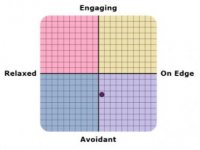Frosty
Hi
- Joined
- Apr 6, 2015
- Messages
- 12,667
- Instinctual Variant
- sp
Attachment Style Test - Individual Differences Research Labs
My result
Completely in the middle between Relaxed and On Edge, 33.3% Avoidant
Somewhere in between these two then
And
Yeah. Sounds accurate. Somewhere between those two descriptions with an underlying hope that Im wrong in my cautiousness irl around others. With the hope of being possibly surprised some day
My result
Completely in the middle between Relaxed and On Edge, 33.3% Avoidant
Somewhere in between these two then
Relaxed-Avoidant (Dismissive): Individuals in this quadrant often take a dim view of others, preferring to keep their distance and guard against invasions of their autonomy and privacy. Relaxed-Avoidant personalities tend to have a strong belief that others are too different from them for truly intimate relations to be worthwhile. They may have a spouse and family, and even be solidly anchored in a stable network of friends and acquaintances, but at the end of the day, they tend to avoid entering into relations where emotional interdependence and intimacy are required. Unlike individuals who fall in the On Edge-Avoidant quadrant, Dismissive personalities tend to be quite content keeping their deepest feelings and views to themselves, and they often have a deeply-held belief that the opinions of others are mildly irrelevant or even second-rate. Consequently, many Dismissive types are often quite good at dissimulating, that is, appearing to share their innermost thoughts, while in reality, they are simply appeasing others without ever letting them come close.
Independent and proud of it, these individuals can typically achieve remarkable feats of social manipulation and self-restraint, but on the downside, they may have trouble kicking bad habits (such as drinking or smoking) which they can enjoy in solitude and use to comfort themselves, independently of the company of others. They can frequently be unmotivated or lazy with regard to the duties that others expect of them, but on the other hand, they are often very original (since they are not hindered by concerns about having to conform to the expectations of the group). Finally, they also tend to be intelligent risk-takers, since they are at heart relaxed and cool under fire.
Independent and proud of it, these individuals can typically achieve remarkable feats of social manipulation and self-restraint, but on the downside, they may have trouble kicking bad habits (such as drinking or smoking) which they can enjoy in solitude and use to comfort themselves, independently of the company of others. They can frequently be unmotivated or lazy with regard to the duties that others expect of them, but on the other hand, they are often very original (since they are not hindered by concerns about having to conform to the expectations of the group). Finally, they also tend to be intelligent risk-takers, since they are at heart relaxed and cool under fire.
And
On Edge-Avoidant (Mistrusting): Individuals in this quadrant share the Dismissive type's misgivings about others, but have not developed the armor of coolness and self-sufficiency that allows Dismissive types to live without attachment and bonding. Consequently, Mistrustful types recognize in themselves a need for intimacy and close relations with others, but as soon as they start to get close to others, they also find that they have mixed feelings about the whole ordeal and start fantasizing about breaking it off because they "want their space again." In short, they are neither at ease in solitude nor when close to others. Because of their simultaneous need for and mistrust of intimacy, Mistrusting types have had to spend their lives learning how to skillfully handle other people; continually maneuvering so as to keep others close and available, yet at the same time out of control and powerless to harm the Mistrusting type. Individuals of this type are often high-achieving and competent adults, but on the inside, they tend to suffer from periodic bouts of low self-esteem and be plagued by a sense of hollowness at their core. Mistrusting individuals are frequently very good at finding legitimate fault with others and sniffing out their weaknesses as a way of protecting themselves against being disappointed by others, but on the downside, this hypervigilance also tends to lead to skepticism and overly paranoid tendencies.
Yeah. Sounds accurate. Somewhere between those two descriptions with an underlying hope that Im wrong in my cautiousness irl around others. With the hope of being possibly surprised some day









